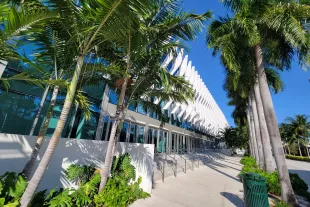30 Million Passengers, 18 New Ships this year. Will Cursing Continue to Grow?
MIAMI BEACH, FL – (April 13, 2019) The cruise industry is steaming past expectations and shows no signs of slowing down, the chief executives of the four largest cruise companies told industry watchers Tuesday.
In 2018, the number of global cruise passengers grew almost 7 percent to 28.5 million, reported the Cruise Lines Industry Association Tuesday at Seatrade in Miami Beach, the world’s largest cruise industry event. And, “there’s nothing I see that suggests any kind of slowdown is on the horizon,” said Frank Del Rio, chief executive of Norwegian Cruise Holdings.
With 18 new ships due for launch this year, the industry is set to host 30 million passengers in 2019, industry leaders reported Tuesday. That translates to 1.1 million workers worldwide and a total economic impact of $134 billion.
Fueling that growth are both millennials and retirees, said the executives, and an industry known for innovation. “We’re constantly looking for what’s next,” said Richard Fain, chairman and CEO of Royal Caribbean Cruises Ltd.
And while it is likely that, overall, cruise ships will continue to get bigger, said MSC chief Pierfrancesco Vago — whose European-based company will launch 7,000-passenger ships in 2022 — smaller ships are also on the way, noted Carnival Corp. CEO Arnold Donald. With a limited supply of world ship-building yards, industry growth will be measured, he said.
BBC World News presenter Lucy Hockings queried the four executives In the opening State of the Industry panel, where topics ranged from the health of the cruise market in China, where most of the major cruise companies have made significant investments, to environmental impact.
Royal Caribbean’s Fain said large ships often have a smaller carbon footprint than smaller ones, thanks in part to technology. Carnival’s Donald noted his company has reduced its fuel consumption by 33 percent since 2007. CLIA recently announced the industry plans to cut the rate of per ship emissions by 40 percent by 2023.
“We sail responsibly,” said Donald. “Nobody wants to go to a polluted marine environment. Sustainability is an imperative to our business.”
That included sustainability of destinations plagued by overtourism. Executives sought to address what they called misperceptions about the negatives of cruising, noting that while Venice has suffered from overtourism, only about 1 million of the city’s annual 20 million visitors come on cruises.
“We have a better way to control passengers,” said Vago.
All four companies are headquartered in South Florida and have a large presence in the Caribbean. As PortMiami expands to accommodate more large ships to sail there, the cruise executives insist that the region is not oversaturated.
“There are some 80 islands in the Caribbean,” Donald said.
Other conference panels explored the increase in luxury expedition options, small yacht-style cruises, river cruises and emerging destinations such as Africa and Istanbul, Turkey, which lost cruises in the wake of a coup attempt in 2016.
Many lines used the conference as an opportunity to explain new product changes, such as ship expansions (Windstar), new partnerships (Carnival, which is partnering with Family Feud) and details about soon-to-launch vessels (Seabourn expedition ship Venture).
SeaTrade organizers expected attendance to exceed 11,000 as the trade show returned to the Miami Beach Convention Center this year following a three-year run in Fort Lauderdale.


